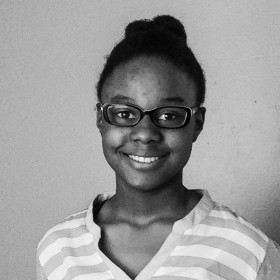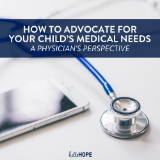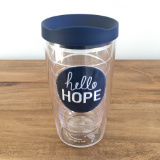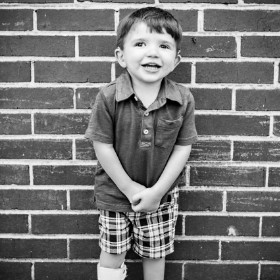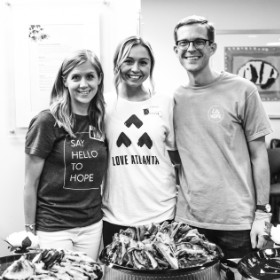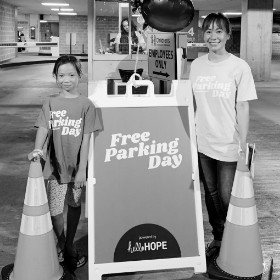Cerebral Palsy: Emeril’s Story of Hope
Raquel Gordon was seven months pregnant with her middle child, a baby girl, when she and her husband, Walter, received a worrying phone call from their obstetrician. Raquel's most recent ultrasound had shown some abnormalities consistent with a stroke. She was immediately referred to a perinatologist who explained that the cause of the stroke was unknown, but it had impacted their daughter's developing brain.
Even with weekly check-ups at the perinatologist, their doctors were unable to determine how the stroke might impact their daughter, or what challenges she might face in development, leaving the Gordons to wait and pray for the safe arrival of their little girl.
Two months later, the Gordons rejoiced in the safe delivery of their daughter, Emeril. Though they knew there would be challenges ahead, her birth went smoothly, and they were soon home enjoying the new addition to their family.
Adapting to life with cerebral palsy
As the days unfolded, Raquel and Walter learned that the stroke had weakened the left side of Emeril's body, causing cerebral palsy, which affects her left leg, arm, and eye. As early as three months old, they began the long road of corrective surgeries and therapy. In spite of it all, Emeril continued to develop into a strong, precocious child, who met her early developmental milestones.
But a new season of challenges unfolded when Emeril experienced her first seizure at the age of six. Though initially terrifying, doctors quickly prescribed medication to keep the seizures in check, and she was able to return to school soon after and remembers getting right back to living life.
Raquel and Walter encouraged their daughter to pursue sports, friendships and her academic interests, encouraging her not to make cerebral palsy the focus of her life. Their hope and belief in a loving God's provision for Emeril reminded them that the physical limitations she faced were not the sum total of her story.
"I came in and hit the ground running," Emeril says. "[My diagnosis] didn't stop me from doing anything — I did everything any other kid would do. I went to school, took classes … When I was seven, I had surgery, and two weeks later I was outside in my pink cast hitting a piñata."
Overcoming challenging days with cerebral palsy
Understandably, there were still hard days and weeks for Emeril and her family. Her health has often kept her out of school and meant more time at home. As she began to experience more setbacks in her middle school years, Emeril began to experience depression, as well. Finding ways to support Emeril's mental health and happiness became an important component of helping her thrive.
Raquel shares, “At one point I said, ‘Her life is not appointments.’ I had to even cut back on that because I would read, read, read, read, and want to take her to see this doctor and that doctor. We traveled to cities around the country searching for answers and help. And, finally, I just said to myself, ‘Her life is not doctor’s appointments. She’s got to live.’”
“God even spoke to my heart about this. He said, ‘You’re going to have to let go. You’re going to have to let me handle this. Her name is written on the palm of my hand, and you’re going to have to let go and trust me.”
Emeril adds, “We still don’t have a lot of answers that I feel we should, and there’s still a load of frustration. But I’ve learned how to approach it differently. Instead of just getting angry about it and being angry all the time, you just have to approach it from a different point. A lot of it has been rooted in faith for me. I figured if God has me still here, there must be something he has for me. Even through all the struggles, there must be a reason why I’m supposed to do it.”
Organizations like Camp Twin Lakes and becoming involved in competitive swimming through Blaze Sports also play an instrumental role in supporting Emeril as she learns how to adapt to her cerebral palsy. Her involvement with these organizations, as well as her brother and sister and community of friends, help to bolster her spirits when the weariness of medical appointments and the pain in her body pose a challenge. Emeril is quick to point out that “When you’re going through something, the people who are closest to you are going through it, too.”
Hope beyond a diagnosis
At eighteen years old, Emeril is a positive and driven young woman. She is a dual enrolled high school senior, swims competitively, and hopes to compete in the Paralympic Games. Emeril is excited to attend college next year to study multimedia communications and sports medicine.
"Sometimes I'm flat-out told that I can't or shouldn't do something," she says. "But then I think, 'At least I can try, because you never know.' Just because one person says I can't doesn't mean that God says I can't."
Even when Emeril experiences nervousness about being away from her family at college, she reminds herself that God is in control of her future and that she has a loving family who will be at her side whenever she needs them. "Recently I've had headache flare-ups, and I worry about going away to school. I also have lots of pain at various places in my body. But I can't stop life, and sometimes it's hard to deal with it, but I just have to keep walking through," Emeril says.
Emeril says she would tell others in her position not to lose heart. "When you get CP, that's a really broad diagnosis. For me, epilepsy, chronic pain, migraines, and GI issues are some of the issues that can fall under that. And so, when you get that initial diagnosis, you don't know what's coming next, and it can be really saddening. Don't give up. Sometimes that means believing you can do well in school, despite what a medical test or scan says. When you believe you can, you'll find the people and resources to help you get to where you want. Sometimes you are your biggest enemy, because when you start believing you can't do something, not even your parents can help you.”
“When you're faced with difficulties, find something you can use to get your mind off of it. Your tendency is to think about it around the clock, but if you're able to, find something that takes you away from it — for me it's music and swimming. And also remember: you can make friends. So many people think they can't make friends when dealing with disability. But you have to believe you can do all of this.”
A marriage strengthened by hope
When asked what hope looks like for the Gordon family, Walter says "Hope to me is that you live to fight another day. One of our family's mottos is 'I can do all things through Christ who strengthens me.' Hope is having a dream and not giving up; waking up every day and being willing to work for it.."
Walter’s perspective also reflects how he and Raquel have grown in their marriage. Through various seasons of hard work, seemingly endless doctor appointments, exhaustion, and victories in spite of a chronic diagnosis, their commitment to each other — no matter what — is a beautiful picture of a strong marriage.
"It has actually brought us closer," Raquel adds, describing how in the early years of Emeril's CP treatment, she tried to handle all medical matters on her own while Walter worked to support their family. "But eventually, my brain was fried. You need to allow your spouse to support you, and allow people to help you. I would definitely say to a parent that you have to let people help you and let people love you. Let people love your baby, so you can take care of yourself through the process and be strong for your child."
Walter also remembers the difficulty of watching his wife carry the burdens of intense research and countless appointments and seeing his daughter in pain. Rather than falling into despair, he and Raquel chose to support each other and look at things through the lens of hope. "I still believe there is a reason for this. We just have to look hard enough to see what God is doing. If a door closes, or we hit a roadblock, that means God is opening another door," Walter says. "Of course for a long time, especially at first, it was like, 'What do we do? Why is she dealing with this?' But now it's a matter of walking in and knowing that God rebuilds."
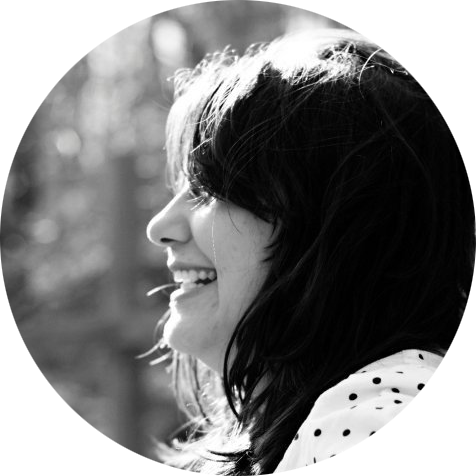
About the Author
Catie Cummings-Morris is a freelance author specializing in non-profit work and food writing living in Chattanooga, Tennessee, with her husband, daughter, and a vegetable garden.
Loading...



